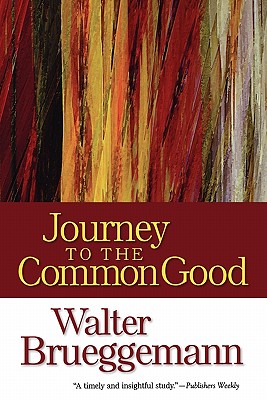I have long been a fan of Walter Brueggemann and Journey to the Common Good has not disappointed me. This book constitutes his Laing Lectures at Regent College from a couple of years ago.
Brueggemann talks about the Exodus story as a journey from a culture of anxiety to a practice of neighbourliness drawing parallels with our own cultures and the challenges we face.
The great crisis among us is the crisis of “the common good,” the sense of community solidarity that binds all in a common destiny – haves and have nots, the rich and the poor. We face a croisis about the common good because there are powerful forces at work among us to resist the common good, to violate community solidarity, and to deny a common destiny. Mature people, at their best, are people who are committed to the common good that reaches beyond private interest, transcends sectarian commitments and offers human solidarity. (p1)
Brueggemann presents a very different view of the Joseph story than the one we usually hold to. He points out that Joseph solidified Pharaoh’s power and enslaved the people, manipulating the economy to concentrate wealth and power in the hands of a few. The situation deteriorates and God intervenes.
The practice of exploitation, fear and suffering produces a decisive moment in human history. This dramatic turn away from aggressive centralized power and a food monopoly features a fresh divine resolve for an alternative possibility.
This divine alternative comes into being through Moses’ dream of a people no longer exploited or suffering but living in the abundance of shared generosity which is the centre of YHWH’s dream. Brueggeman very helpfully contrasts this to Pharaoh’s dream, a nightmarish dream of scarcity which precipitated the crisis encouraging Abraham and others like him to seek the security of food in Egypt even if it meant slavery.
The bread of the wilderness, the bread that God gives us to eat, is a very different sort of bread. It is the bread of YHWH’s generosity,
a gift of abundance that breaks the deathly pattern of anxiety, fear, greed and anger, a miracle that always surprises because it is beyond our capacity of expectation.
Brueggemann points out that is this bread that fills the Israelites as they stand at Mt Sinai to receive God’s commands, commands that voice God’s dream of a neighbourhood and God’s intention for a society grounded in the common good.
The exploitative system of Pharaoh believed that it always needed more and was always entitled to more – more bricks, more control, more territory, more oil – until it had everything. But of course one cannot order a neighbourhood that way, because such practices and such assumptions generate only fear and competition that make the common good impossible Such greed is prohibited by YHWh’s kingdom of generosity. (25)
This is a challenging and thought provoking book that reminded me of how easily I seek my own good over the common good and how frequently I need to be challenged afresh with the values and principles of God’s new society. Our God is a generous God – not to me as an individual for the accumulation of personal wealth, but to us as a society of God’s people. This type of generosity must be shared, it must seek the common good and it must work for the welfare of all.
Journey to the Common Good, is a must read for all of us who seek to ground our lives in the shared values of God’s abundance and generosity rather than in the acquisitive values of our culture.

